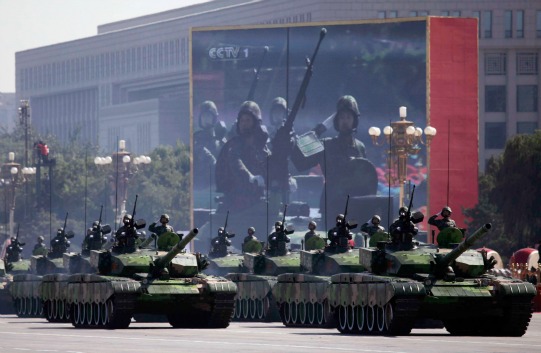Is America's Military Might Fading? China's Ascent And The Implications

Table of Contents
The Decline Narrative: Assessing America's Military Capabilities
The narrative of a declining America's military might rests on several key factors. While the US military remains the most powerful globally, concerns exist regarding its long-term capabilities.
Budgetary Constraints and Spending Efficiency
The US defense budget, while substantial, faces increasing scrutiny. The relative proportion of defense spending compared to the GDP has decreased over the past decades, creating challenges in balancing budgetary priorities. This affects crucial areas such as:
- Decreased defense spending compared to GDP: A shrinking percentage of GDP dedicated to defense leaves less room for modernization and expansion.
- Challenges in balancing budget priorities: Competing demands for resources within the government necessitate difficult choices, potentially impacting military readiness.
- Impact on equipment maintenance and upgrades: Deferred maintenance and delayed upgrades can compromise the effectiveness and longevity of existing military assets.
- Potential for personnel shortages: Budgetary constraints can affect recruitment and retention efforts, leading to potential personnel shortages across various branches of the military.
These factors, collectively, raise questions about the US military's ability to maintain its technological edge and operational readiness in the long term. Effective resource allocation within the defense budget is crucial to maintaining America's military strength.
Technological Superiority: A Shifting Landscape?
While the US military has historically enjoyed a decisive technological advantage, this is increasingly being challenged. China and other nations are rapidly developing and deploying advanced technologies that could erode this superiority. Key areas of concern include:
- Advancements in hypersonic weapons: The development of hypersonic weapons by China and Russia poses a significant challenge to existing US defense systems.
- AI applications in warfare: The integration of artificial intelligence into military systems is transforming warfare, and the US must ensure it maintains a competitive edge in this field.
- Cybersecurity threats: The increasing sophistication of cyberattacks poses a major threat to US military infrastructure and operations.
- The development of countermeasures to US technology: Adversaries are actively developing countermeasures to negate the effectiveness of US military technology.
Maintaining technological superiority requires substantial and sustained investment in research and development, fostering innovation, and adapting to emerging threats. The future of America's military might hinges on its ability to address these technological challenges.
China's Military Modernization: A Force to be Reckoned With
China's military modernization is a significant factor in the shifting global military power balance. The scale and speed of its expansion are unprecedented.
Technological Leap and Investment
China has made massive investments in its military, focusing on technological advancements and modernizing its armed forces across all branches. This includes:
- Increased defense spending: China's military spending has increased exponentially over the past decades, fueling significant technological advancements.
- Focus on naval modernization: China is rapidly expanding its naval capabilities, including aircraft carriers and advanced submarines, projecting power globally.
- Development of advanced weaponry: China is developing and deploying a range of advanced weaponry, including hypersonic missiles and advanced fighter jets.
- Investment in space-based capabilities: China's investments in space-based assets are enhancing its surveillance, reconnaissance, and communication capabilities.
This rapid military expansion is transforming China into a formidable military power, significantly impacting the global military landscape.
Regional Assertiveness and Global Ambitions
China's growing assertiveness in the South China Sea and its expanding global influence are causing concerns among many nations. Its actions include:
- Territorial disputes: China's claims in the South China Sea have led to increased tensions with neighboring countries.
- Military exercises: Large-scale military exercises showcase China's growing military capabilities and its willingness to project power.
- Economic leverage: China uses its economic strength to exert influence and pressure on other nations.
- Diplomatic influence: China is actively engaging in diplomacy and international organizations to shape the global agenda.
This assertive posture highlights China's growing ambition to reshape the regional and global order, leading to increased geopolitical competition.
Implications for the Global Order and Future Conflicts
The potential shift in global military power has far-reaching implications for international security and stability.
Shifting Balance of Power
A shift in the global power balance could have profound consequences:
- Impact on international alliances: Existing alliances might need to adapt to the changing power dynamic.
- Deterrence strategies: Deterrence strategies will need to be reassessed and potentially recalibrated.
- Risk of miscalculation and escalation: Increased competition could raise the risk of miscalculation and unintentional escalation of conflicts.
- Implications for global stability: The shift could destabilize regions and potentially lead to increased conflict.
Navigating this complex shift requires careful consideration of the geopolitical implications and a proactive approach to risk mitigation.
The Role of Diplomacy and Strategic Partnerships
Effective diplomacy and strategic partnerships are crucial for managing the evolving geopolitical landscape:
- Strengthening existing alliances: Reinforcing existing alliances will be crucial in deterring aggression and maintaining stability.
- Building new partnerships: Building new partnerships will expand the network of allies and create a stronger counterbalance.
- Emphasizing communication and dialogue: Open communication and dialogue are essential to reducing misunderstandings and preventing conflict.
- Preventing conflict: Proactive diplomacy and conflict prevention mechanisms are critical in mitigating the risks of escalating tensions.
A combination of military strength and diplomatic engagement is vital for maintaining a stable and secure international order.
Conclusion
The question of whether America's military might is fading is multifaceted. While the US military retains significant advantages, budgetary constraints, and the rapid modernization of China's military present serious challenges. China's growing assertiveness and technological advancements are reshaping the global power balance, leading to increased geopolitical competition and the potential for instability. A proactive approach that combines military readiness, technological innovation, robust diplomatic engagement, and strategic partnerships is crucial for managing this complex transition. Further research into China's military modernization and the evolving global security landscape is crucial for a comprehensive understanding. Continue exploring this critical topic to form your own informed opinion on America's military strength and its future.

Featured Posts
-
 Stock Market Update Dow Jones And S And P 500 Live Data May 30
May 31, 2025
Stock Market Update Dow Jones And S And P 500 Live Data May 30
May 31, 2025 -
 Foire Au Jambon Bayonne Analyse Des Frais D Organisation Et Du Deficit De 2025
May 31, 2025
Foire Au Jambon Bayonne Analyse Des Frais D Organisation Et Du Deficit De 2025
May 31, 2025 -
 Supercross Returns To Salt Lake City Dates Tickets And What To Expect
May 31, 2025
Supercross Returns To Salt Lake City Dates Tickets And What To Expect
May 31, 2025 -
 Guelsen Bubikoglu Ndan Esi Tuerker Inanoglu Icin Dolu Dolu Anilar
May 31, 2025
Guelsen Bubikoglu Ndan Esi Tuerker Inanoglu Icin Dolu Dolu Anilar
May 31, 2025 -
 Arese Borromeo E Il Neorealismo Un Analisi Fotografica Di Ladri Di Biciclette
May 31, 2025
Arese Borromeo E Il Neorealismo Un Analisi Fotografica Di Ladri Di Biciclette
May 31, 2025
